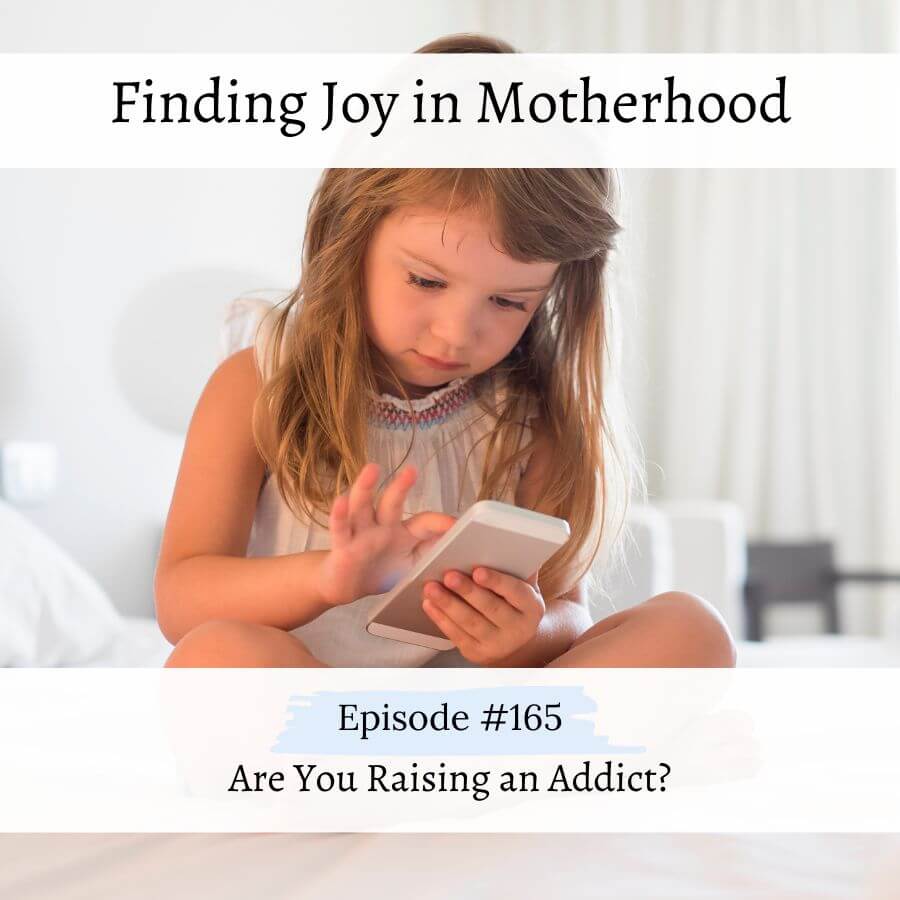Subscribe:
Like What You Hear and Want More?
Find out more about Reimagine Motherhood, my monthly coaching program. I give practical tools and help you make mindset shifts to create the marriage, motherhood, and home you’ve always wanted.
Notes from this Episode
Background
- Sometimes some of the behaviors and actions that we take as parents set our children up for addictions or failures.
- We want to set our children up to be strong, virtuous adults, but we sometimes forget that we have to let our children experience some of the pains of life.
- Today, I want to talk about some of the potential consequences of actions that we may take with our children.
When Children Buffer
- We teach our children to turn to other things (i.e., phones, TV, video games, food, etc.) or distractions to cope with their feelings, rather than processing their feelings.
- In the coaching world, we call this “buffering”. We use these distractions to create a protective barrier against negative emotions as well as to either protect us emotionally or to change how we feel emotionally.
- As adults, the more we do a particular activity to buffer, the more we reinforce the need for it, and we become dependent on the buffering of false pleasure.
The Primitive Brain
- As adults, we know that life is a blend of positive and negative emotions and experiences.
- Our primitive brain does not like to experience the negative aspects and experiences of life.
- Instead, our brains tell us to do something to avoid the pain, conserve energy, and avoid conflict and confrontation.
- We can turn to food, sugar, alcohol, social media, binge-watching Netflix, etc.
- We also do this for our children when we teach them how to cope with negative feelings by using something else to distract them rather than feeling the negative feelings.
Some Statistics of Addiction in Children
- On average, children ages eight to twelve spend 4-6 hours a day watching or using screens, and teens can spend 9+ hours.
- The Mayo Clinic warns that too much screen time can develop poor sleeping habits, raise the risk of developing ADHD, anxiety, and depression.
- Children who spend more than two hours a day on screen time activities score lower on language and thinking tests.
- Children who spend more than seven hours a day on screens show a thinning of the brain’s cortex, which manages critical thinking and reasoning.
Teaching Our Children to Deal with Negative Emotions
- Buffering also creates many emotional issues, specifically the inability of dealing with negative emotions.
- If we do not teach them as children, they are not going to know it as adults.
- The secular culture tells us we should always be happy and fulfilled, and we can fall into the trap of believing that lie. If we do it for ourselves, then we are probably doing it for our children.
- It is critical for our children to experience disappointment, anger, sadness, being left out, etc.
The Importance of Teaching Your Children How to Handle Emotions
- Your children are going to have negative emotions – it is part of the human condition.
- Your job is to teach them how to process those emotions.
- The false pleasures we give our children are an easy to completely avoid dealing with the negative emotions.
- Facilitating the avoidance of these emotions does not make them going away. It just helps our children not to see or feel them.
- When we give our children outside coping mechanisms and distractions, we remove the opportunities for them to learn how to self-regulate, how to live and process negative emotions, and how to solve their own problems.
How to Teach Your Children Emotional Regulation
- Develop a deep connection with each child.
- Identify the trigger when they have a negative emotion.
- Connect with your child, identify the trigger, and help them learn how to deal with it.
- Validate and relate to the negative emotion.
- Talk with your children and ask them questions – they have answers!
- Help your children with strategies to overcome the trigger obstacles.
- Show acceptance of how they are feeling.
- Teach your children emotional regulation.
- What can they do instead to deal with the emotion?
- Always give positive feedback.
- Allow your children to cry, but not to scream and yell and throw things.
- Give your children ways to control and regulate their emotions and then provide positive feedback when they do handle their negative emotions well.
- Children learn by watching, so take a step back and analyze how you deal with negative emotions?
Final Thoughts
- You are your child’s first and primary teacher, and it is imperative that you teach them how to deal with everything that comes up in their life.
- Your job is not to make sure your children are pacified all day long but to help them develop into virtuous adults who can handle negative emotions.
- Do not give your children the habit of depending on some outside force to avoid processing their feelings. Teach them how to process.

